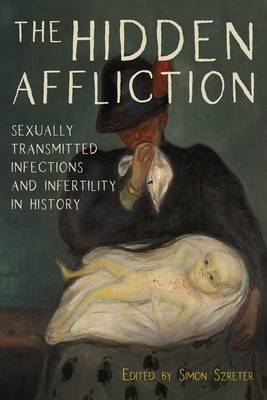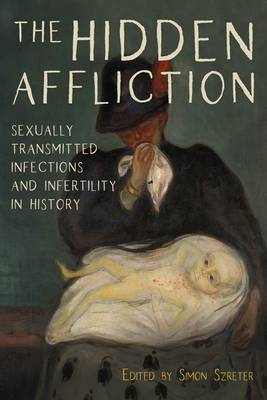
Wil je zeker zijn dat je cadeautjes op tijd onder de kerstboom liggen? Onze winkels ontvangen jou met open armen. Nu met extra openingsuren op zondag!
- Afhalen na 1 uur in een winkel met voorraad
- Gratis thuislevering in België vanaf € 30
- Ruim aanbod met 7 miljoen producten
Wil je zeker zijn dat je cadeautjes op tijd onder de kerstboom liggen? Onze winkels ontvangen jou met open armen. Nu met extra openingsuren op zondag!
- Afhalen na 1 uur in een winkel met voorraad
- Gratis thuislevering in België vanaf € 30
- Ruim aanbod met 7 miljoen producten
Zoeken
The Hidden Affliction
Sexually Transmitted Infections and Infertility in History
€ 158,45
+ 316 punten
Omschrijving
Multidisciplinary collection of essays on the relationship of infertility and the "historic" STIs--gonorrhea, chlamydia, and syphilis--producing surprising new insights in studies from across the globe and spanning millennia. A multidisciplinary group of prominent scholars investigates the historical relationship between sexually transmitted infections and infertility. Untreated gonorrhea and chlamydia cause infertility in a proportion of women and men. Unlike the much-feared venereal disease of syphilis--"the pox"--gonorrhea and chlamydia are often symptomless, leaving victims unaware of the threat to their fertility. Science did not unmask the causal microorganisms until thelate nineteenth and twentieth centuries. Their effects on fertility in human history remain mysterious. This is the first volume to address the subject across more than two thousand years of human history. Following asynoptic editorial introduction, part 1 explores the enigmas of evidence from ancient and early modern medical sources. Part 2 addresses fundamental questions about when exactly these diseases first became human afflictions, withnew contributions from bioarcheology, genomics, and the history of medicine, producing surprising new insights. Part 3 presents studies of infertility and its sociocultural consequences in nineteenth- and twentieth-century Africa, Oceania, and Australia. Part 4 examines the quite different ways the infertility threat from STIs was perceived--by scientists, the public, and government--in late nineteenth- and early twentieth-century Germany, France, and Britain, concluding with a pioneering empirical estimate of the infertility impact in Britain. Simon Szreter is Professor of History and Public Policy, University of Cambridge, and Fellow of St. John's College, Cambridge.
Specificaties
Betrokkenen
- Uitgeverij:
Inhoud
- Aantal bladzijden:
- 450
- Taal:
- Engels
- Reeks:
- Reeksnummer:
- nr. 46
Eigenschappen
- Productcode (EAN):
- 9781580469616
- Verschijningsdatum:
- 1/10/2019
- Uitvoering:
- Hardcover
- Formaat:
- Genaaid
- Afmetingen:
- 152 mm x 229 mm
- Gewicht:
- 771 g

Alleen bij Standaard Boekhandel
+ 316 punten op je klantenkaart van Standaard Boekhandel
Beoordelingen
We publiceren alleen reviews die voldoen aan de voorwaarden voor reviews. Bekijk onze voorwaarden voor reviews.










